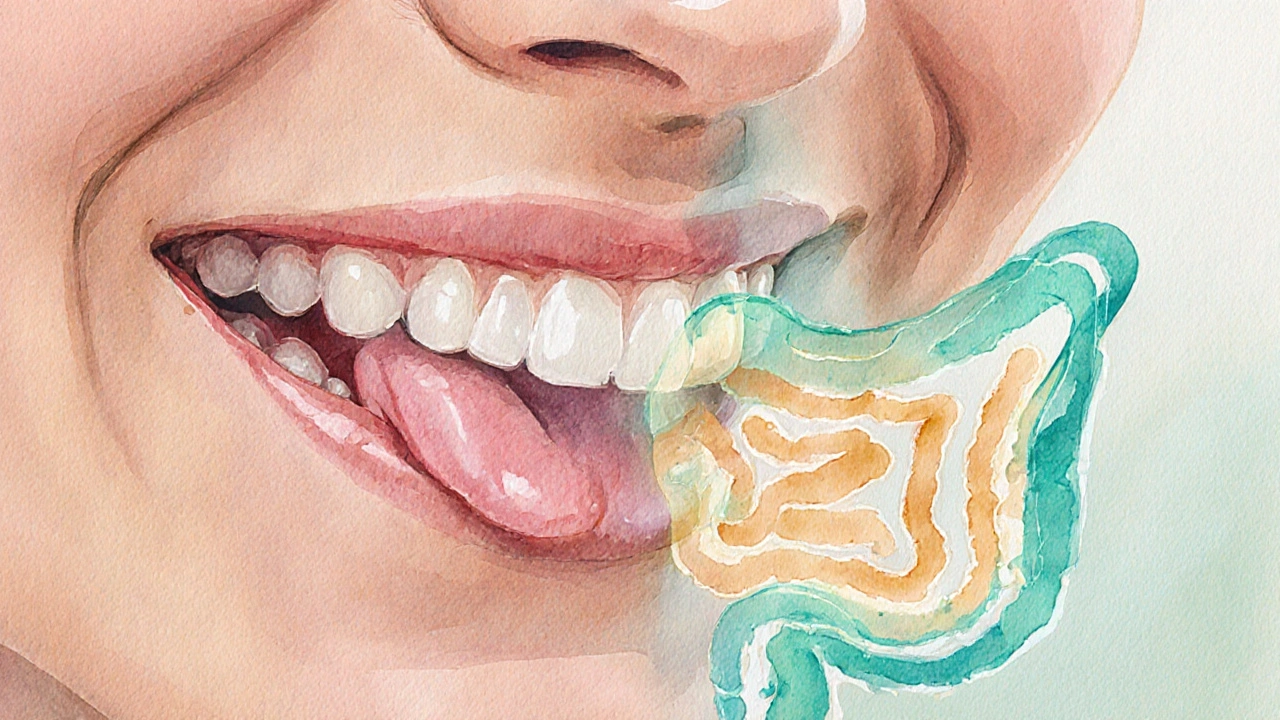Oral health is a state of the mouth, teeth, gums and related tissues free from disease and discomfort, essential for nutrition, speech and overall immunity. For people living with inflammatory bowel disease (IBD), maintaining good oral health isn’t just about a bright smile-it's a critical factor that can influence gut inflammation and flare‑ups.
How IBD and the Mouth Talk to Each Other
Research from gastroenterology journals shows a two‑way street between the gut and the mouth. The gut microbiome the community of trillions of bacteria, fungi and viruses residing in the intestines shapes immune responses that travel through the bloodstream to the oral cavity. Conversely, oral bacteria from dental plaque a sticky biofilm that coats teeth can enter the gut and exacerbate dysbiosis, a harmful imbalance linked to IBD activity.
When the gut barrier weakens during a colitis flare, toxins and inflammatory cytokines spill over, making gums more susceptible to periodontal disease chronic inflammation of the tissues supporting teeth. This creates a vicious cycle: gut inflammation fuels gum disease, and gum disease feeds systemic inflammation.
Oral Signs to Watch for in Ulcerative Colitis vs. Crohn's Disease
| Feature | Ulcerative Colitis | Crohn’s Disease |
|---|---|---|
| Apthous ulcers | Common (30‑40% of patients) | Very common (50‑60%) |
| Angular cheilitis | Occasional | Frequent |
| Gingival bleeding | Moderate | Severe |
| Oral “cobblestoning” | Rare | Typical |
| Salivary gland swelling | Rare | Intermittent |
These patterns help clinicians distinguish which IBD subtype might be driving oral complaints, but the key takeaway for you is the same: any new mouth pain, persistent sores, or bleeding gums deserve attention.
Why oral health colitis Should Be on Your Daily Checklist
Living with colitis already means juggling diet, medication and stress. Adding a simple oral‑care routine can cut down on systemic inflammation by up to 15%-a figure reported in a 2023 longitudinal cohort of 2,400 IBD patients. Good oral hygiene reduces the bacterial load that could otherwise travel to the gut, lowering the risk of flare‑ups.
Beyond the numbers, practical benefits include:
- Fewer painful ulcerations that interfere with eating.
- Reduced need for high‑dose steroids to manage gum inflammation.
- Improved nutrient absorption because a healthy mouth encourages proper chewing.
Building an IBD‑Friendly Oral‑Care Routine
- Gentle brushing. Use a soft‑bristled fluoride toothpaste to strengthen enamel and reduce bacterial growth. Brush for two minutes twice daily, focusing on the gum line.
- Interdental cleaning. Floss or use water‑flossers to dislodge plaque in hard‑to‑reach spots. For patients with joint pain from arthritis (common in IBD), a pre‑curved floss holder eases the motion.
- Antimicrobial mouthwash. Choose an alcohol‑free rinse containing chlorhexidine or essential oil blends. Use once a day after brushing; avoid over‑use (more than 2 weeks) to prevent staining.
- Probiotic boost. Select lozenges or yogurts with Lactobacillus reuteri a strain shown to lower oral inflammation in IBD patients. Aim for 1‑2billion CFU daily.
- Hydration. Sipping water throughout the day maintains saliva flow, which naturally washes away bacteria and buffers acids.
Stick to this routine even during remission; consistency is key to preventing flare‑triggering bacterial spikes.

Nutrition & Supplements that Support Both Gut and Mouth
Deficiencies in vitaminsD,B12 and iron are common in colitis due to malabsorption. Each plays a role in oral tissue health:
- VitaminD - strengthens gum immunity; aim for 800‑1,000IU daily.
- VitaminB12 - prevents glossitis and mouth ulceration; supplement 500µg sublingually if labs are low.
- Iron - low iron can cause atrophic tongue and sore mouth; work with your gastroenterologist to titrate oral or IV iron.
Omega‑3 fatty acids, found in fish oil, also dampen systemic inflammation, which indirectly protects gums.
When to Call a Dentist Who Understands IBD
Not every dentist knows the gut‑mouth connection. Look for a practitioner who asks about gastrointestinal history, avoids invasive scaling during active flares, and coordinates care with your gastroenterologist.
Schedule a dental check‑up at least twice a year, but add a “quick‑look” appointment if you notice any of these red flags:
- New or enlarging aphthous ulcers that don’t heal in 10 days.
- Persistent gum bleeding despite routine brushing.
- Swelling of the lips or tongue that interferes with eating.
- Unexplained taste changes or dry mouth.
Early intervention can prevent the need for surgical gum procedures and keep your medication regimen stable.
Managing Oral Health During a Colitis Flare
During a flare, pain and fatigue may make thorough brushing feel impossible. Adapt your routine:
- Switch to a soft‑bristled electric toothbrush which reduces manual force while still cleaning effectively.
- Use a milder, fluoride‑only mouthwash to avoid irritating inflamed mucosa.
- Increase probiotic intake to help restore gut‑oral microbial balance.
- Focus on hydration; sip water or oral rehydration solutions between meals.
These tweaks maintain oral hygiene without adding extra stress to an already taxed system.
Bottom Line: A Small Daily Investment Pays Big Health Dividends
For colitis sufferers, oral health isn’t a cosmetic afterthought; it’s a modifiable factor that can lower systemic inflammation, improve nutrient intake, and possibly reduce the frequency of disease flares. By treating your mouth as an extension of your gut, you gain a powerful ally in the battle against IBD.

Frequently Asked Questions
Can periodontal disease trigger a colitis flare?
Yes. Inflammation in the gums releases cytokines that travel through the bloodstream and can amplify gut inflammation, potentially sparking a flare.
Are there specific mouthwashes safe during an IBD flare?
Alcohol‑free, chlorhexidine‑based rinses are generally safe for short‑term use. Avoid essential oil formulas with strong menthol if you have ulcerated oral lesions, as they may sting.
How often should I see a dentist if I have ulcerative colitis?
At least twice a year for a full exam, plus any extra visits when you notice new sores, bleeding gums, or persistent dry mouth.
Do probiotics really help my mouth if I have IBD?
Clinical trials in 2022-2023 showed that strains likeLactobacillus reuteri reduced mouth ulcer frequency by 25% in IBD patients, likely by balancing oral microbiota.
What nutrients are most important for gum health in colitis?
VitaminD, vitaminB12, iron, and omega‑3 fatty acids. Deficiencies in any of these can worsen gum inflammation and slow healing of oral lesions.
Can a dentist treat oral ulcers directly?
Dentists can prescribe topical corticosteroids, pain‑relieving gels, or antimicrobial lozenges to speed healing, but they’ll coordinate with your gastroenterologist for systemic management.
Is flossing safe during a severe flare?
Yes, but use a gentle floss or a water flosser to avoid irritating inflamed gums. The goal is to remove plaque without causing trauma.
How does the gut‑mouth axis differ between ulcerative colitis and Crohn’s disease?
Both share systemic inflammation, but Crohn’s often involves deeper oral tissue changes (cobblestoning, salivary gland swelling), while ulcerative colitis more commonly presents with shallow aphthous ulcers.


Henry Seaton
Oral health is a clear link to gut inflammation and those with colitis should never skip brushing.
Baby Thingie
Maintaining a rigorous oral hygiene regimen can reduce systemic cytokine load; therefore it is advisable to incorporate flossing and an alcohol‑free mouthwash. :)
Abby Elizabeth
OMG i cant even with how much my gums bleed when i have a flare, it's like my mouth is on fire and nobody gets how painful it truly is!!!
Mark Haycox
Thes teeth brusing rnt just for prettyness it is a damn necessity for colitis patints cuz the bakteri can travel to the gut.
Michael Taylor
Honestly, I think it’s wonderful how a simple two‑minute brushing routine, combined with gentle flossing and the occasional antimicrobial rinse, can create a protective barrier that benefits both your smile and your digestive health, especially when you’re juggling the many challenges of IBD!
Desiree Tan
Listen, if you’re dealing with colitis, you need to double‑down on oral care right now-brush, floss, and hydrate like your health depends on it, because it does!
Andrea Dunn
Did you ever think the pharma giants don’t want you to know that a clean mouth can actually keep your gut calm? They profit from flare‑ups 😒
Erin Johnson
Sure, because nothing says ‘effective IBD management’ like ignoring the fact that oral bacteria can act as miniature invaders, right? Let’s all pretend the mouth doesn’t matter.
Selena Justin
It is my pleasure to acknowledge the importance of synchronizing dental examinations with gastroenterological follow‑ups, thereby fostering a holistic approach to patient care.
Bernard Lingcod
Curious how many of us actually check our gums when a flare hits? Let’s make a habit of quick oral scans daily; the payoff is worth it!
Raghav Suri
Honestly, the data is clear-good oral hygiene cuts down inflammatory markers, so it's a no‑brainer for anyone fighting colitis.
Freddy Torres
Oral care is the silent steward of gut tranquility; neglect it, and the harmony shatters.
Andrew McKinnon
While some patients might dismiss the oral‑gut axis as hype, the evidence base suggests a microbial flux that can modulate NF‑κB pathways, which, frankly, is not optional.
Dean Gill
Taking care of your mouth when you have colitis is more than a cosmetic concern; it is a therapeutic strategy that can influence disease trajectory. First, regular brushing with a soft‑bristled fluoride toothpaste removes plaque that harbors pathogenic bacteria capable of migrating to the intestine. Second, interdental cleaning, whether with floss or a water flosser, reaches areas where a toothbrush cannot, further decreasing microbial load. Third, an alcohol‑free antimicrobial mouthwash applied once daily helps suppress oral pathogens without irritating ulcerated tissue. Fourth, probiotic lozenges containing Lactobacillus reuteri have been shown in clinical trials to reduce the frequency of mouth ulcers in IBD patients. Fifth, staying well‑hydrated maintains saliva flow, which naturally cleanses the oral cavity and buffers acids. Sixth, supplementing vitamins D, B12, and iron addresses common deficiencies that compromise gum integrity and mucosal healing. Seventh, omega‑3 fatty acids from fish oil can dampen systemic inflammation, indirectly supporting periodontal health. Eighth, scheduling dental check‑ups twice a year ensures early detection of gingival bleeding or lesions before they exacerbate gut inflammation. Ninth, communicating your gastrointestinal history to your dentist allows for tailored treatment plans that avoid aggressive scaling during flares. Tenth, if you notice persistent aphthous ulcers beyond ten days, seek professional care promptly to prevent secondary infection. Eleventh, consider using a pre‑curved floss holder if arthritis makes manual flossing painful, as joint health often co‑exists with IBD. Twelfth, avoid tobacco and limit alcohol, both of which can aggravate oral and intestinal mucosa. Thirteenth, practice mindful chewing by taking smaller bites, which reduces strain on inflamed gums and improves nutrient absorption. Finally, viewing oral hygiene as an integral part of your IBD management empowers you to control a modifiable factor that can lessen flare frequency and improve overall wellbeing.
Royberto Spencer
One must ask whether neglecting oral health while suffering from colitis is not a betrayal of one's own body, a temple that deserves reverence.
Annette van Dijk-Leek
Wow!!! I love how simple steps like brushing twice daily and using a probiotic rinse can create a powerhouse of protection for both mouth and gut!!! Keep it up!!!
Katherine M
It is incumbent upon clinicians and patients alike to recognize the bidirectional relationship between oral and intestinal homeostasis; such awareness may foster interdisciplinary collaboration and ultimately enhance therapeutic outcomes. 🌐
Bernard Leach
While many individuals underestimate the impact of dental hygiene on systemic inflammation the truth is that oral pathogens can serve as reservoirs for inflammatory triggers and this fact should compel us to adopt comprehensive oral care regimens that include regular brushing flossing and the occasional use of an alcohol free antimicrobial rinse especially for those battling chronic conditions such as ulcerative colitis or Crohn's disease because the gut mouth axis is undeniably significant and deserves our attention.
Shelby Larson
Listen, i read the studies and i know the facts: if u skip brushing u just hand the gut a free pass for more inflammation, lol.